Iran Spokesman Again Links Europe’s Natural Gas Need To Nuclear Talks
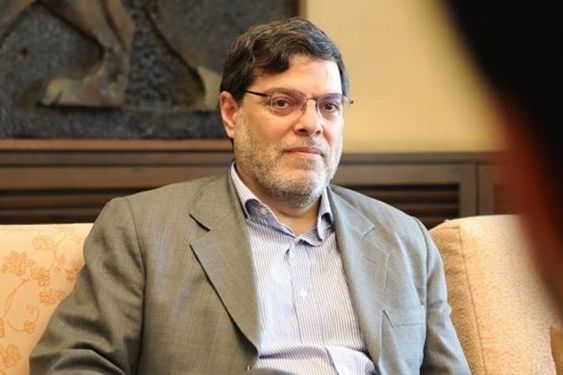
Mohammad Marandi, who acts as de facto spokesman for Iran's nuclear negotiating team, has tried to link energy needs in Europe to ongoing talks for reviving the 2015 agreement.

Mohammad Marandi, who acts as de facto spokesman for Iran's nuclear negotiating team, has tried to link energy needs in Europe to ongoing talks for reviving the 2015 agreement.

In a Twitter message in Persian, the influential Iraqi Shiite cleric Moqtada al-Sadr has urged Iranian pilgrims to abide by Iraq’s laws and regulations.
“The host must show respect toward the guest, and the guest must be respectful of the hosts habits and traditions,” Sadr said in his message addressed to Iranian pilgrims, adding that they should observe discipline when entering the country for the upcoming, million-strong Arbaeen Walk, have official permits and passports, and respect the country’s officials, security forces, and laws.
The Arbaeen ceremony which falls on September 18 this year marks the end of the 40-day mourning period following Ashura -- the religious ritual for the commemoration of the third Shia Muslim Imam, Husayn ibn Ali, the grandson of the Prophet Muhammad, in 680 AD – is the world's largest annual gathering.
Millions of Shia Muslims gather every year to mark Arbaeen in Karbala, Iraq, where the imam is buried. Many walk long distances, even hundreds of kilometres, to the shrine of the Imam.
Iranian authorities deploy all religious entities and media to encourage pilgrimage to Karbala. Government organisations and the state affiliated charities as well as municipalities and city councils often allocate considerable budgets to organize the Arbaeen Walk and offer various services, including free Wi-Fi, along the way and in Karbala. Last year Tehran City Council approved two urgent bills to allocate a budget of 60 billion rials for holding the Jim ceremonies.
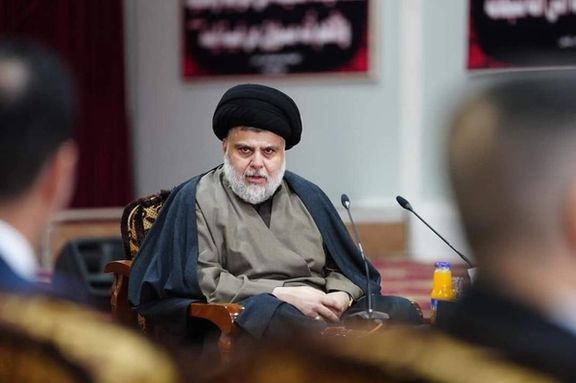
Sadr pointed out in his message that Iraq is not obliged to accept more pilgrims than it can handle and urged Iraqi authorities not to entrust the security of the ceremonies to anyone other than the country’s own security forces. He was referring to armed militia groups affiliated with the Islamic Republic and others.
Sadr also urged Iraqis to show self-restraint and avoid any kind of conflict with pilgrims, cooperate with security forces in maintaining the security of pilgrims and holy sites, and avoid divisive slogans.
Relative calm was restored in Iraq after Sadr urged all his supporters to leave the streets following recent clashes between his supporters and pro-Iranian militias that killed about 30 people.
Violence erupted in Iraq on August 29 when Sadr -- who seeks to curb the influence of the Islamic Republic in Iraqi politics -- announced that he was quitting politics because his followers were not getting a fair share in the political structure of the country.
As violence intensified, Iranian media reported that all air and land borders with Iraq were closed and that the Iranian embassy in Baghdad and other diplomatic missions faced attacks by Sadrists.
Political rivalry between Sadr’s followers and Iran-aligned parties and paramilitary groups, mainly militias of the Asa'ib Ahl al-Haq group, has left Iraq without a government since the parliamentary elections of October 2021 in which Sadrists won the most seats.
Clashes between Sadr’s followers and Iranian-backed militias in the end of August in the Iraqi capital, Basra, and other major cities have left over a dozen dead.
Apparently referring to the recent violence, Iran's Supreme Leader Ali Khamenei blamed the United States for accusations that Iran meddles in the affairs of other nations in a speech Saturday and said Iran’s encouragement of other nations “to stand up against world powers’ bullying” is the main reason for tensions with the Islamic Republic.

A rights group says the Islamic Republic has sentenced two LGBTQ activists to death on charges of "corruption on earth through the promotion of homosexuality."
Hengaw Organization for Human Rights said on Sunday that the verdict was issued by the Revolutionary Court of the city of Orumiyeh (Urmia), in West Azarbaijan province against Zahra Sedighi-Hamedani (31), known as Sareh, Elham Choubdar (24). Another woman, Soheila Ashrafi (52), was involved in the joint case, but her verdict has not been issued yet.
In July, Iran’s Revolutionary Guard said Sedighi-Hamadani has been slapped with new charges of "trafficking Iranian women" to Erbil, in Iraqi Kurdistan, referring to her as Zahra Mansouri Hamedani. She was first arrested on charges linked to an appearance in a BBC documentary on gay rights in Iraqi Kurdistan.
She was arrested while trying to cross the border and seek asylum in Turkey on October 27, 2021. She was held in solitary confinement for 53 days, during which, the Revolutionary Guard subjected her to intense interrogations, insulted her identity and appearance, threatened to execute her and to take away custody of her children.
On January 16, Sareh was accused of “spreading corruption on earth,” including through "promoting homosexuality”, “communication with anti-Islamic Republic media channels” and “promoting Christianity.”
Rights group Amnesty International appealed to Iran’s Chief Justice Gholamhossein Mohseni-Ejei on January 25, calling for release.
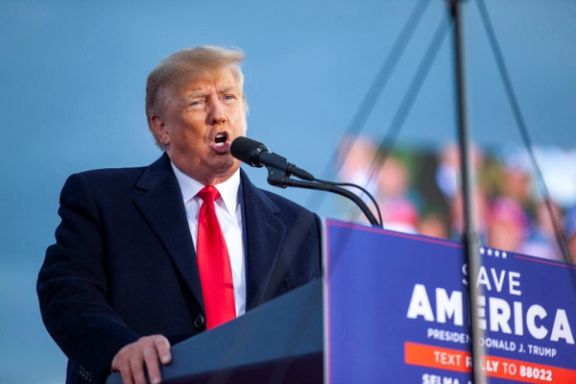
Former US president Donald Trump has once again rebuked Joe Biden’s administration for the apparently imminent agreement to revive the 2015 nuclear deal with Iran.
In a Saturday rally among his supporters in Wilkes-Barre, Pennsylvania, Trump said, “Iran was dying to make a deal with me. I would have had a deal done with Iran one week after the election.”
Criticizing the possible financial benefits of such a deal for the Islamic Republic, he said that “now we’re going to pay them hundreds of billions of dollars, and they’re going to have nuclear weapons within a short period of time. Honestly, they can’t be stupid; they must hate our country.”
He also denounced Biden’s policies that are "allowing Iran to build a massive nuclear weapon.”
Moreover, Trump praised China’s President Xi Jinping for ruling the Chinese people with an iron fist, remarks that prompted Mohammad Marandi, an advisor-cum-spokesman for Iranian negotiators, to respond. “Your regime has bloodied much of the world with an iron fist,” he tweeted on Sunday.
Trump concluded by repeating his chorus, saying “Iran, China, Russia and North Korea weren't going to do a thing against us just two years ago,” but now “we're a nation that is no longer respected or listened to around the world.”
Hassan Rouhani, the only Iranian president who has ever spoken to a US president, was quoted as saying that he had a chance to talk with Trump when he was in New York in 2019. Rouhani talked with Barack Obama over the phone in September 2013.
On Thursday, September 1, a bipartisan group of 50 US lawmakers sounded the alarm on a looming agreement with Iran,urging the administration to immediately consult with Congress.
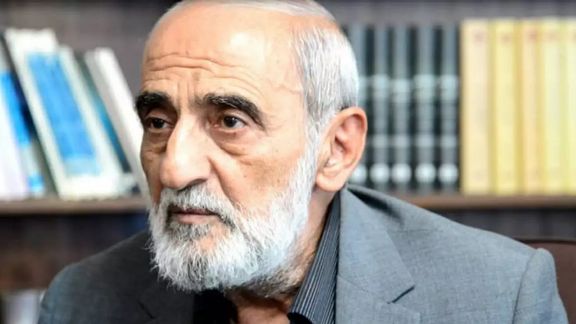
A top Iranian ultra-conservative close to the Supreme Leader says nuclear talks with the West are futile and Iran should exit the Nuclear Non-Proliferation Treaty.
Fars news website affiliated with the Revolutionary Guard Sunday published an interview with Hossein Shariatmadari, chief editor of the hardliner Kayhan Daily, blasting the nuclear negotiations as a Western ploy and recommending to quit the NPT.
Kayhan is published under the supervision of Supreme Leader Ali Khamenei’s office and Shariatmadari is his representative at the flagship paper.
The ultra-conservative ideologue said that 20 years of talks prove that “the other side is not worried about Iran producing nuclear weapons, rather it uses the issue as an excuse to keep sanctions” as the only remaining lever for the United States “to confront Islamic Iran,” and it will never give then up.
He went on to argue that consequently, it is meaningless to negotiate, and diplomacy “will lead nowhere”. As an example, Shariatmadari said that the United States openly and clearly says it cannot provide guarantees about its commitments to an agreement. “What kind of an agreement is it when the other side is not willing to provide guarantees about acting according to its commitments?”
At the same time, Ali Khezrian, a member of parliament from the hardliner Paydari Front, in a note published by media, quoted specific clauses of what he claimed to be the new draft nuclear deal, arguing that it is a weak agreement for Iran.

He argued that nuclear activities should not be reduced before US sanctions are lifted and Iran is able to verify that it can conduct business without being impeded by US economic restrictions.
He cited the draft agreement to say that the new deal does not meet this Iranian demand, inscribed in a parliament law passed in December 2020. Khezrian specifically referred to the third appendix of the draft agreement arguing that the US will remove oil sanctions after Iran begins reducing its key nuclear activities, without a chance to verify the US step.
The lawmaker also complained that Washington has not provided any guarantees in the new agreement to remain in the deal and not to use the UN Security Council ‘trigger mechanism’, or to impose new sanctions. On the contrary, Khezrian claimed that in section 5 of the draft, it is Iran that first has to execute its commitments before the US carries out its own obligations.
In addition, international banks must verify who they would be dealing with in Iran to avoid interacting with sanctioned entities, which Khezrian said would lead to heavy fines for any bank violating this part of the agreement.
He also criticized the fact that US ‘foreign terrorist’ designation will remain in place against the Revolutionary Guard, IRGC, and this would impact other areas of business and trade.
Iran had been insisting on removing the IRGC from the US list of Foreign Terrorist Organization (FTO), but US President Joe Biden opposed such a move.
Iran’s argument was that since the IRGC runs large business conglomerates in the country, its continued FTO designation would have ripple effects in Iran’s economy and its ability to have trade and other economic ties with foreign entities.
Kayhan’s editor Shariatmadari in his interview summed up the position of many hardliners. “The ups and downs of negotiations in the past 20 years leave no doubt that if we do not pay ransom – which the current government would not – the talks will go nowhere…and we reach the conclusion that we have to withdraw from the NPT.”

Hassan Rouhani, the only Iranian president who has ever spoken to a US president, says he had a chance to talk with Donald Trump when he was in New York in 2019.
Rouhani talked with US President Barack Obama over the phone in September 2013. Obama initiated the call when the Iranian president was on his way to the airport to fly back to Iran after attending the UN General Assembly meeting.
Aftab News website in Iran on September 4, quoted one of the three authors of a book about Rouhani's presidency as saying that "although tensions between Tehran and Washington rose to an unprecedented high level during Donald Trump's Presidency, Rouhani was only one step short of meeting with Trump in 2019."
The meeting, which was well publicized at the time, did not take place, but Rouhani has spoken about the chance to shake hands with Trump in a recent meeting with a circle of insiders including the three authors of "A War with No Fire or Smoke" Behran Mehrju, Vali Khalili and Arash Pourebrahimi. However, Aftab News did not reveal which of the trio disclosed Rouhani's remarks.
"If Obama was in office as US President rather than Trump, I would have definitely gone to meet with him," the author quoted Rouhani. The remark reminded the author of a statement made by Rouhani in 2013 before becoming Iran's President. Rouhani had said pointing at his chest: "My heart is full of secrets, but I will speak only when someone challenges and provokes me."
Three chances for peace
Rouhani said that Iran had three chances to make peace with America and end the US sanctions. "In the first occasion Europeans led by French President Emmanuel Macron tried to mediate between Tehran and Washington. The second occasion was former Japanese Prime Minister,” who took the lead as mediator. And the third one came up during his visit to New York in September 2019.
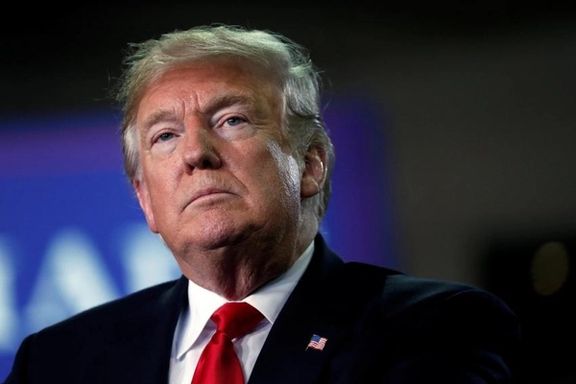
"The P5+1 members also came there. Former German Chancellor Angela Merkle who rarely went to New York also showed up. UK Prime Minister Boris Johnson also came although he was in the middle of a domestic political tempest. Russia and China's foreign ministers also extended their visit to New York. Mediators were trying to solve the problems between Iran and America, and everything was prepared for direct talks."
Who takes credit?
But there was a problem. Rouhani recalled: "Trump insisted that he should break out the news about the meeting. But I knew he was an actor. He was not an ordinary man. He was acting all the time. A good actor. I was worried that he might announce the meeting and then disrupt the game."
Rouhani was even ready to take part in the meeting on the condition that the news of the meeting would be released while the meeting was taking place. "But at the last minute, we decided that there was no chance for an honest dialogue with Trump on equal footing. And others knew about it."
What about Khamenei?
Rouhani’s account of the events in 2019 should be considered from another angel. No one knows for sure whether Rouhani contacted Supreme Leader Ali Khamenei in the meantime, but based on previous experience, Khamenei most likely intervened at the last moment and cancelled the meeting. Knowing Khamenei and Rouhani, it is unconceivable to think that Rouhani would have met Trump without first seeking Khamenei's permission.
At the same time in Tehran, -then- government spokesman Ali Rabiei said Rouhani was not slated to meet with Trump and that no conditions have been set for such a meeting. "There is no reason for a meeting between Rouhani and an economic terrorist," said Rabiei.
Nonetheless, later in October Rouhani blamed Trump for the failure of the talks in which he said Macron was also slated to take part. He was probably referring to the fact that Trump imposed a new set of sanctions on Iran on 24 September 2019 after he realized that a meeting with Rouhani was not going to take place.
Marandi published a series of tweets from his interview with Al Jazeera news channel on Saturday, saying, “Iran will be patient. The US under Obama systematically violated the deal and under Trump/Biden it imposed maximum pressure against innocent citizens... Winter is approaching and the EU is facing a crippling energy crisis.”
Emphasizing that “Iran won't accept ambiguities or loopholes in the text,” he said, “There should be no loopholes that can be used to undermine a deal. There are problems with a few words and the US can easily fix them.”
“The US domestic situation is a key reason why a nuclear deal has been allusive (elusive). While some EU governments have already asked Iran about oil as well as natural gas exports, Biden is fearful that foes will depict him and certain allies as weak,” he added.
Tehran is trying to sell the agreement as beneficial to Europe's energy crunch, regardless of the fact that even with no sanctions or restrictions on Iran’s exports, the country is unable to provide European countries with natural
Iranian media repeatedly talks about ‘Europe’s freezing winter” while it has almost nothing to do with Tehran’s crude oil exports, except generally helping to bring down oil prices. Europe’s need to replace Russian gas is a specific issue on its own that Iran cannot help with due to its own shortages. A nuclear agreement now cannot impact Iran’s ability to export natural gas for the foreseeable future mainly due to Iran’s huge domestic need.